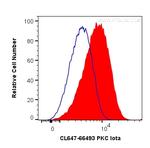Search Thermo Fisher Scientific
Proteintech
PKC Iota Monoclonal Antibody (3A1B6), CoraLite® Plus 647
FIGURE: 1 / 1
PKC Iota Antibody (CL647-66493) in Flow

Product Details
CL647-66493
Species Reactivity
Host/Isotype
Class
Type
Clone
Immunogen
Conjugate
Excitation/Emission Max
Form
Purification
Storage buffer
Contains
Storage conditions
Shipping conditions
Product Specific Information
Immunogen sequence: SSLGLQDFDL LRVIGRGSYA KVLLVRLKKT DRIYAMKVVK KELVNDDEDI DWVQTEKHVF EQASNHPFLV GLHSCFQTES RLFFVIEYVN GGDLMFHMQR QRKLPEEHAR FYSAEISLAL NYLHERGIIY RDLKLDNVLL DSEGHIKLTD YGMCKEGLRP GDTTSTFCGT PNYIAPEILR GEDYGFSVDW WALGVLMFEM MAGRSPFDIV GSSDNPDQNT EDYLFQVILE KQIRIPRSMS VKAASVLKSF LNKDPKERLG CLPQTGFADI QGHPFFRNVD WDMMEQKQVV PPFKPNISGE FGLDNFDSQF TNERVQLTPD DDDIVRKIDQ SEFEGFEYIN PLLMSAEECV
Target Information
The PKC family of serine/threonine kinases, including PRKCI (PKC iota), is activated intracellularly by signal transduction pathways. In humans, at least 12 different PKC polypeptides have been identified. These isoforms differ in primary structure, tissue distribution, subcellular localization, mode of action in vitro, response to extracellular signals, and substrate specificity. PKC alpha, beta I, beta II and gamma form the conventional family; their activities are Ca2+- and phospholipid-dependent. The PKC family comprises at least eight members, which are differentially expressed and are involved in a wide variety of cellular processes. This protein kinase is calcium-independent and phospholipid-dependent. It is not activated by phorbolesters or diacylglycerol. This kinase can be recruited to vesicle tubular clusters (VTCs) by direct interaction with the small GTPase RAB2, where this kinase phosphorylates glyceraldehyde-3-phosphate dehydrogenase (GAPD/GAPDH) and plays a role in microtubule dynamics in the early secretory pathway. This kinase is found to be necessary for BCL-ABL-mediated resistance to drug-induced apoptosis and therefore protects leukemia cells against drug-induced apoptosis. There is a single exon pseudogene mapped on chromosome X.
For Research Use Only. Not for use in diagnostic procedures. Not for resale without express authorization.
References (0)
Bioinformatics
Protein Aliases: aPKC-lambda/iota; Atypical protein kinase C-lambda/iota; nPKC-iota; PRKC-lambda/iota; Protein kinase C iota type; protein kinase C, iota; protein kinase C, lambda
Gene Aliases: 2310021H13Rik; AI427505; aPKClambda; DXS1179E; mKIAA4165; nPKC-iota; PKCI; Pkcl; PKClambda; PRKCI; Prkcl
UniProt ID: (Human) P41743, (Mouse) Q62074, (Rat) F1M7Y5
Entrez Gene ID: (Human) 5584, (Mouse) 18759, (Rat) 84006

Performance Guarantee
If an Invitrogen™ antibody doesn't perform as described on our website or datasheet,we'll replace the product at no cost to you, or provide you with a credit for a future purchase.*
Learn more
We're here to help
Get expert recommendations for common problems or connect directly with an on staff expert for technical assistance related to applications, equipment and general product use.
Contact tech support
